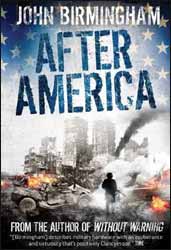|
Click here to return to the main site. Book Review
It has been four years since the event which wiped out most of the higher primates in the United States and the world looks very different. What was once a cohesive gargantuan country has been plunged almost back to the level of the Wild West. With space, but too few people to populate, let alone run the country, America finds itself internally divided and beset with invaders intent on either robbing the still standing cities or dealing the final death blow to their old enemy... After America is the continuation of the story which started in Without Warning. The series is written by Australian author of alternative histories, John Birmingham. One word of warning, this is the middle of a three book series and does not work well as a standalone novel. The story is told from a number of perspectives, which is both the book's strength and weakness, as not all the stories are equally compelling. With the States trying to pick itself up, the incumbent President, James Kipper sees his nation's future bound up with the reclaiming of the sea ports in New York. However, New York has become an area controlled by pirates, gangsters and jihadist. To be honest Kipper is a city engineer elevated to the office of President and Birmingham portrays him as a man with a moral centre, basically good, but it takes him the vast majority of the book's six hundred and eleven pages to come to the obvious solution about New York. In the meantime his dithering costs lives. For the greater part of the book the focus is on New York. We initially have Kipper's perspective, which gives the wider tactical view as well as two personal perspectives of the actual condition on the streets. Jules and the Rhino, who we last saw transporting refugees in a boat that they had acquired, are now deep in the city, seemingly working for a reconstruction crew, but in actual fact on a mission to retrieve papers for their well-paying client. On the front line the philosopher soldier, Fryderyk Milosz kills, curses and philosophises. To allow Birmingham to show us the rest of the country and its attempt not to descend into irretrievable anarchy we follow the story of Miguel Pieraro, and his daughter Sofia, who travel with a Mormon group after the rest of the family are wiped out. This, for me at least, was the weakest part of the book. I didn’t find Miguel a compelling character in the first book and nothing he experienced here really changed my mind. There are on-going plot lines developed from the first book. The Israeli bombing of Muslim countries sparks a wider Jihad and introduces new characters, including Yusuf Mohammed, a former African boy soldier who now finds himself fighting in the ruins of New York. Who knowingly is also connected to Caitlin Monroe’s story strand. Overall, it was a good continuation of the story with enough variety to offer something to most people. Birmingham writes well even if you sometimes don’t agree with the direction he takes some of the characters. 7 Charles Packer |
|---|


